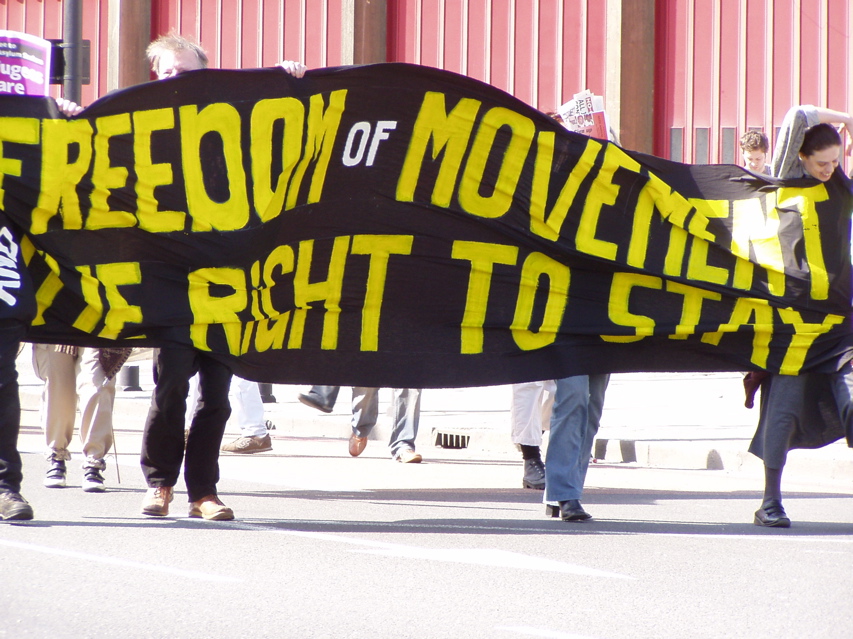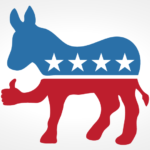LISTEN TO TLR’S LATEST PODCAST:
By Zach Foster
Open borders is still a touchy subject in libertarian and conservative circles. Many see the concept of open borders as a threat to the nation. Nationalism isn’t dead, but it’s definitely evolving. More and more people are coming to the idea that culture and people make a nation, not lines on a map.
The alt-right intellectuals have become extreme nationalists in how they justify strict immigration enforcement by the federal government on the notion that illegal immigration is a bigger threat to private property than the state. Many on the Right advance the myth that national borders are necessary to create state borders, and that state borders make possible county and city borders. They argue that city borders make it possible to define the borders of one’s private property.
Are National Borders the Cornerstone of Private Property?
This idea cooked up against open borders is grossly wrong. By definition, national borders can’t exist in stateless societies, although nations can. Culture, tradition, and common agreements make a nation. Americans are a nation for their common agreement in the ideals of freedom and the democratic republic of the people as outlined in the Constitution. These values will still be held in high esteem after the state. Even anarchist libertarians still believe in freedom and self-ownership, and they still reflect America’s unique combination of Western culture, capitalist culture, and rugged individualism.
America’s borders have changed constantly throughout its history. Like other nations, America never needed borders for national identity. Israel is a nation because of the long Jewish traditions from the days when the Israelites were a wandering people, not because nationalist social democrats drew lines on a map of British-occupied Palestine. In the words of Rabbi Yaakov Shapiro, “We are the Jewish nation. Our homeland is our Torah, our Holy Bible.”
Borders don’t define nations and cities don’t define private property; certificates of ownership and purchase receipts do. If necessary, a map and a satellite photo with the certificate and receipt will do. The chain of owners that a piece of land or a car goes through after the state will trace back to the property owners at the last twilight of the state, and even possibly beyond. Some pieces of property in the U.S. today date back to the colonial era and are still legally held up by charters from the British, French, and Spanish monarchies, even though those monarchies have no authority in America.
City-States and Rural Homesteads
In Los Angeles County, home of 12 million people, city borders have become irrelevant. Los Angeles and its suburbs (including Orange County) are effectively their own city-state with economic and political power to rival the state government in Sacramento. L.A. has its own unique culture and its borders are maintained by the tightness of its own population. The population density plummets at I-15 and eastward into San Bernardino County, most of which is still empty desert.
Language, customs, and proximity with other human beings define our concept of who we are, NOT the lines on a map. Even after the state, the free flow of actual laissez-faire trade isn’t likely to cause a population spike in Wyoming or Nebraska.
Americans from coast to coast easily identify geographically as both American and Virginian, or American and a New Yorker. Others easily identify by ethnicity, as in being American and Mexican, or American and Navajo. City borders ought not to be defined by government-imposed lines on a map, but instead by agreements among the people who voluntarily live in a particular population cluster and rural spread.
In places like San Francisco Bay and Pennsylvania’s Amish country, socialism and communal living will be voluntarily practiced by large chunks of the population. In places like northern Nevada and rural Alabama, God-fearing homesteaders will continue lording over their ten or twenty acres. Pot farmers in the former State of Jefferson and moonshiners in the Blue Ridge may continue guarding their livelihoods with automatic weapons simply for tradition more than necessity.
In a stateless Southern California or the Dallas suburbs, what people do with their 2,000 square feet, and what they allow their neighbors to do with it, will be entirely up to them. There may even be a boom in private courts of law, and for property owners, renters, and neighbors to contractually subscribe to a brand of private courts for peaceful resolution of property disputes to be possible. I know people will still be fighting their homeowners’ associations and landlords long after the state.
What about people’s homes and private property?
A person’s private property, his home, is his border. A person’s border is not in San Diego or El Paso. People ought to be armed, and regarding a group of armed men coming to appropriate a person’s house… does he not have neighbors? Does he not subscribe to any form of mutual aid or mutual defense with other armed members of your community? In the absence of a federal army or a state National Guard, is there no local militia? Is there no insurance-style neighborhood watch, no defenses at the city’s edge, or on the frontiers of a rural region? In this age of government monopoly on force, entrepreneurs wasted no time in forming entire private security firms patrolling business lots and neighborhoods.
And American modern history is filled with example after example of private property being violated by city governments because that property was inside city borders. Bureaucrats seem to think the legal fiction of a municipal government means they can do as they please. For example, hundreds of small trees were planted in people’s front yards by the City of San Dimas government years ago… The city planners, city council, and county environmental people decided San Dimas ought to have more trees, and my neighbors’ impeccable lawns be damned. In the age of the state, I would rather knowingly hire an undocumented Mexican blue collar worker to voluntarily mow my lawn than for the city government to arbitrarily put things there because they think they can.
What About Drug Cartels Extorting and Killing People on the Border?
Criminal groups already extort and kill people on the border. They have for a hundred years. When it wasn’t criminal groups killing people in Texas and Arizona, it was vigilantes killing the ‘accomplices’ spared by the criminals. This can actually be avoided or minimized after the state.
According to Ron Paul, Rand Paul, Walter Block, Jeffrey Tucker, Murray Rothbard, Mark Thornton, Roderick Long, and even Frederic Bastiat, the conditions for the violence of the drug war are created by government. If the war on drugs is ended, the cartels will have no choice but to transition into the legal market rather than the gun-to-your-head black market. Less violence, less death, less destruction, less theft and extortion are in that future. Soon after alcohol Prohibition ended in 1933, violent crime in America plummeted by 50%. Applying this line of logic to today’s parallel War on Drugs leads to one market-oriented solution: end the War on Drugs.
Open Borders, Armed Squatters, and Threats to Private Property
Does this system give heavily armed squatters more rights to property than the homeowner? Not at all. Might does not make right, nor does the armed squatter boogeyman negate open borders as a viable system. Again, when the state goes, the police go with it, so civil society with or without open borders will have security needs. In that vacuum, private security firms, bounty hunters, neighborhood watch groups, and the local militia or defense association will fill that need for protection from violent predators. Aversion to this ‘system’ of voluntary cooperation (i.e. people doing what they please) discounts millions of red-blooded gun owners who will never allow mobs of foreigners to uproot their next-door neighbors or next-town neighbors by force of arms. Generations of voluntary migration and interaction is not equivalent to short-term military or paramilitary conquest.
Closing Thoughts on Open Borders and Stateless Societies
The concepts discussed here relating to open borders and spontaneous anarchic order aren’t meant to be prophesy. They’re meant to painting a picture of a future that could be. Many libertarians and conservatives like to talk a good game about limited government and “don’t tread on me,” but their Stockholm syndrome for the government shines through in their fear to take the limited government concept to its logical conclusion. Past transitions from one state to another have often been violent and chaotic. Future transitions from governmental states to ‘states’ of anarchy as described by Jeffrey Tucker’s essays shouldn’t have to be violent or chaotic.
WATCH TLR’S LATEST VIDEO:





2 comments
… [Trackback]
[…] Information to that Topic: thelibertarianrepublic.com/open-borders-private-property-state/ […]
… [Trackback]
[…] Information to that Topic: thelibertarianrepublic.com/open-borders-private-property-state/ […]